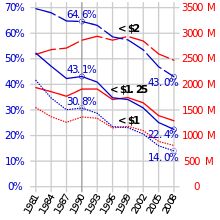
Back Armoedeverligting Afrikaans الحد من الفقر Arabic Armutsbekämpfung German Reducción de la pobreza Spanish Réduction de la pauvreté French Pengentasan kemiskinan ID Riduzione della povertà Italian Mitigatio paupertatis Latin Намалување на сиромаштијата Macedonian Armoedebestrijding Dutch

Poverty reduction, poverty relief, or poverty alleviation is a set of measures, both economic and humanitarian, that are intended to permanently lift people out of poverty. Measures, like those promoted by Henry George in his economics classic Progress and Poverty, are those that raise, or are intended to raise, ways of enabling the poor to create wealth for themselves as a conduit of ending poverty forever. In modern times, various economists within the Georgism movement propose measures like the land value tax to enhance access to the natural world for all. Poverty occurs in both developing countries and developed countries. While poverty is much more widespread in developing countries, both types of countries undertake poverty reduction measures.[1]
Poverty has been historically accepted in some parts of the world as inevitable as non-industrialized economies produced very little, while populations grew almost as fast, making wealth scarce.[2] Geoffrey Parker wrote: "In Antwerp and Lyon, two of the largest cities in western Europe, by 1600 three-quarters of the total population were too poor to pay taxes, and therefore likely to need relief in times of crisis."[3] Poverty reduction occurs largely as a result of overall economic growth.[4][5] Food shortages were common before modern agricultural technology and in places that lack them today, such as nitrogen fertilizers, pesticides and irrigation methods.[6][7] The dawn of the Industrial Revolution led to high economic growth, eliminating mass poverty in what is now considered the developed world.[4] World GDP per person quintupled during the 20th century.[8] In 1820, 75% of humanity lived on less than a dollar a day, while in 2001 only about 20% did.[4]
In the 21st century, continued economic development is constrained by the lack of economic freedoms. Economic liberalization requires extending property rights to the poor, especially to land.[9] Financial services, notably savings, can be made accessible to the poor through technology, such as mobile banking.[10][11] Inefficient institutions, corruption, and political instability can also discourage investment. Aid and government support in health, education, and infrastructure helps growth by increasing human and physical capital.[5] Poverty alleviation also involves improving the living conditions of people who are already poor. Aid, particularly in the medical and scientific areas, is essential in providing better lives, such as the Green Revolution and the eradication of smallpox.[12][13] Problems with development aid include the high proportion of tied aid, which mandates receiving nations to buy products, often more expensive, originating only from donor countries.[14] Nevertheless, some like Peter Singer in his book The Life You Can Save believe that small changes in the ways people in affluent nations live their lives could solve world poverty.
- ^ "Women's Empowerment in Zambia | Volunteer Abroad in Africa". CISaustralia. Retrieved 20 May 2021.
- ^ "Under traditional (i.e., non-industrialized) modes of economic production, widespread poverty had been accepted as inevitable. The total output of goods and services, even if equally distributed, would still have been insufficient to give the entire population a right to an adequate standard of living by prevailing standards. With the economic productivity that resulted from industrialization, however, this ceased to be the case" Encyclopædia Britannica, "Poverty"
- ^ Geoffrey Parker (2001). "Europe in crisis, 1598–1648". Wiley–Blackwell. p. 11. ISBN 0-631-22028-3
- ^ a b c "Ending Mass Poverty" by Ian Vásquez, Cato Institute, 4 September 2001
- ^ a b Krugman, Paul, and Robin Wells. Macroeconomics. 2. New York City: Worth Publishers, 2009. Print.
- ^ Easterbrook, Gregg (1 January 1997). "Forgotten Benefactor of Humanity". The Atlantic. Retrieved 16 October 2019.
- ^ "Ethical Man blog: Is the green movement part of the problem?". BCC.
- ^ Angus Maddison, see graph
- ^ "Business – Land rights 'help fight poverty'". BBC News. 20 June 2003.
- ^ Kiviat, Barbara (30 August 2009). "Next Step for Microfinance: Taking Deposits". Time. ISSN 0040-781X. Retrieved 16 October 2019.
- ^ "Africa's mobile banking revolution". 12 August 2009. Retrieved 1 November 2019.
- ^ Cite error: The named reference
newsweekwas invoked but never defined (see the help page). - ^ "Science/Nature – Why aid does work". BBC News. 11 September 2005.
- ^ Cite error: The named reference
tiedaidwas invoked but never defined (see the help page).